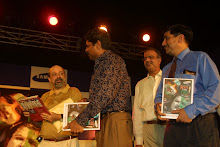Published in The Hindustan Times (March 30, 2009)
By Gulu Ezekiel
For over 50 years, the world of football’s major headache has been the club v. country struggle.
Cricket has been bedeviled with so many controversies over the last century. But club v. country was one thorny issue it did not have to ever contend with.
Until now that is. The Indian Premier League in just its second year has plunged international cricketers into a quandary.
Their dilemma is over whether to choose to wear national colours and travel around the world the whole year. Or stick to their IPL franchises and pocket ten times more money for playing six weeks of 20/20 cricket in one country.
The issue has come into sharp focus with a number of recent incidents.
The latest of these is the case of England all-rounder Andrew Flintoff of the Chennai Super Kings who with compatriot Kevin Pietersen was the highest bid player this season.
With the prestigious ‘Ashes’ series later this year in England (as well as the T-20 World Cup), Flintoff’s fitness had been a major cause of concern.
He has had to return home after just three games for knee surgery and will miss next month’s Test series against the West Indies. There is a cloud over his fitness for the rest of the international season as well.
For those three appearances Flintoff will reportedly receive $600,000—or $200,000 for each three-hour game! It is money that was unheard of in cricket till recently.
Flintoff is part of the England and Wales Cricket Board (ECB) central contracts system. Former England captain Nasser Hussain has now attacked the ECB as “wimps” for not insisting the injury-prone Flintoff miss the IPL and rest ahead of the hectic international season.
That is what Cricket Australia did with their fast bowler Shaun Tait. Many top Australians in fact decided to give this IPL season a miss to stay fresh for national duty.
Hussain (and Mike Atherton, another former captain) have also attacked English cricketers for being greedy—signing lucrative central contracts and demanding a piece of the IPL pie as well.
In fact the top English cricketers held out on signing their central contracts last year when they were refused permission to participate in the IPL inaugural season.
There is also the issue of premature retirements from international cricket. New Zealand’s all-rounder Jacob Oram who like Flintoff is also injury prone and plays for Chennai has made it clear where his priorities lie.
While not denying there is pride in playing for the country, Oram admits the IPL is all about the money. He says he intends to quit Test cricket in order to preserve his body for the more lucrative and less physically taxing 20/20 leagues springing up around the world.
The latest of these is the just-announced American Premier League to be staged in New York at the end of the year. The APL claims to have recruited a number of recently retired players as well as those connected with the ‘rebel’ Indian Cricket League, the precursor to the IPL.
When Australian media magnate Kerry Packer dropped his bombshell of World Series Cricket in 1977, players from around the cricket world (except India) flocked to his ‘rebel’ league and faced the wrath of the establishment.
Players back then unlike today were paid a pittance and Packer’s offers were irresistible.
The difference between WSC and IPL is the latter is part and parcel of the establishment since it comes under the purview of the Board of Control for Cricket in India. In effect and right under the eyes of the hapless ICC, the BCCI has created a monster which has the money power to change the structure of world cricket as we have known it for nearly 150 years.
On the face of it, the ICC could solve the problem by keeping a window open for the IPL every year when no other international cricket is staged.
However, one can be sure the likes of Modi and his minions would not be satisfied with just one window. Last year flush with the success of the inaugural season he grandly announced the IPL would have two seasons a year.
Modi and the BCCI may have created a monster but it is far from a Frankenstein’s monster which destroyed its creator. Instead it could well be a precursor to multi IPL seasons as well as IPL clones, both sanctioned and unsanctioned (like the APL) cropping up around the world. In fact Modi has already expressed his wish to take the IPL around the world.
If sponsors, advertisers, spectators, TV viewers and the players themselves decide city-based franchise cricket is the future, the ICC will cease to exist and so will country v. country contests.
And there may be no escape from that in our modern market-driven world where the word ‘traditionalist’ is frowned upon, even despised. For many of us who have a genuine love for cricket as a sport— as distinct from ‘show-biz’ and ‘entertainment’--that is a grim but realistic scenario.
Subscribe to:
Post Comments (Atom)

No comments:
Post a Comment